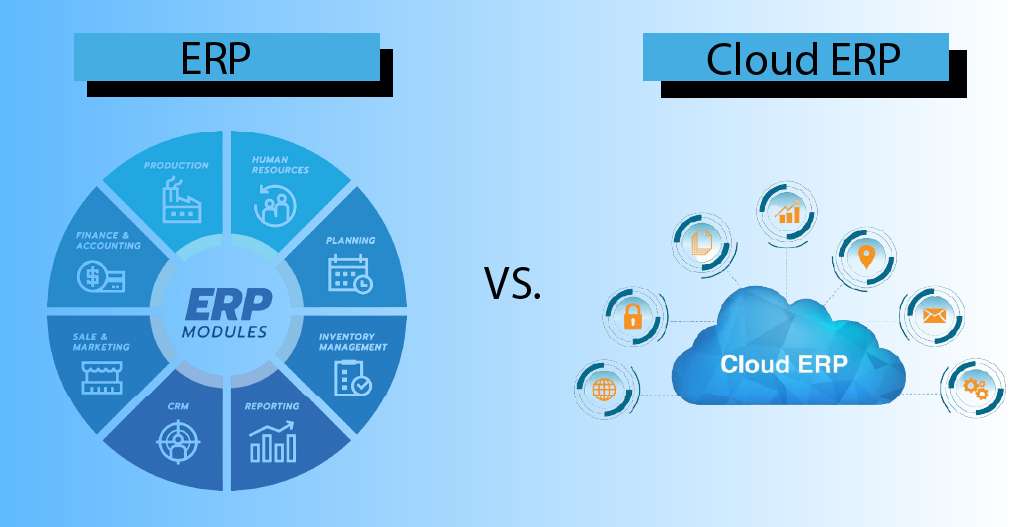ERP vs. Cloud-based ERP: What are the Major Differences Between them?
To understand the major difference between ERP and Cloud ERP, first we need to understand what ERP and Cloud ERP are?

Enterprise Resource Planning is a suite of software applications designed to help companies manage day-to-day business activities, including accounting, inventory and order management, human resources, customer relationship management, and supply chain management. It provides a centralized database that connects all business departments and enables them to work together efficiently.
Cloud ERP
Enterprise resource planning (ERP) software that is hosted on a cloud computing platform is referred to as cloud ERP or SaaS (Software-as-a-Service) -based ERP. This means that the software is developed and maintained by a third-party vendor in their own data center and distributed to clients online, usually on a subscription basis. Compared to traditional on-premise ERP systems, cloud ERP has several benefits, such as cheaper startup costs, better flexibility, and enhanced accessibility and security.
Difference Between ERP and Cloud ERP
| Basis | ERP | Cloud ERP |
| Definition | ERP stands for Enterprise Resource Planning. | It is an ERP software that is hosted on a cloud computing platform known as Cloud ERP. |
| Types of ERP | It is an on-premise software solution. | It is a cloud-based software solution. |
| Hosting | It is set up on the company’s servers and managed by the IT department. | It is hosted on a vendor’s server and managed by the cloud ERP provider. |
| Requirement needed | It requires a heavy investment in upfront in hardware, software, and IT resources. | It requires a lower upfront investment as there is no need to purchase hardware or software. |
| Scalability | It offers limited scalability as the company’s own IT infrastructure constrains it. | It provides greater scalability because it is simple to scale up or down according to business needs. |
| Maintenance Required | It requires regular maintenance and updates by the company’s IT team. | It is automatically updated by the cloud ERP provider, reducing the maintenance burden on the company. |
| Accessibility | It may have limited accessibility as it can only be accessed on-premise or through a VPN. | It provides more accessibility as it can be accessed from any location with an internet connection. |
| Security | It may have limited security as it is managed by the company’s IT team. | It offers greater security as it is managed by the cloud ERP provider, who has specialized expertise in security. |
User-Friendliness and Training are important factors to consider when choosing the right Enterprise Resource Planning (ERP) system. Here’s a brief explanation of these factors:
The user-friendliness of an ERP system refers to how simple and intuitive its user interface and functionalities are to use. With the end user in mind, a user-friendly system is developed, making it simpler for employees at all levels to browse, understand, and complete tasks in the ERP system. Equipped with a well-designed user interface, clear workflow, and intuitive functions, using an ERP system can improve productivity, fewer user errors, and reduce the learning curve. Considering user-friendliness helps to ensure that employees can quickly adapt to the ERP system, resulting in higher user adoption rates and increased efficiency.
Adequate training is essential for employees to understand how to use the ERP system effectively. Training programs should cover various aspects of the system, including navigation, data entry, reporting, and specific modules relevant to different roles. The availability of comprehensive training resources, such as documentation, tutorials, and instructor-led sessions, is crucial for a successful implementation. Additionally, ongoing training and support should be provided to address any system updates or new features introduced over time. ERP system provides thorough training that equips employees with the necessary skills and knowledge to maximize the benefits of the ERP system and perform their job responsibilities effectively.
